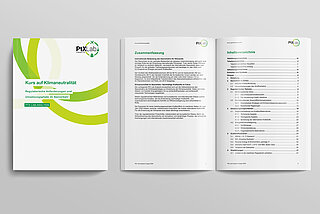PtX Lab Lausitz suggests strategies for climate-neutral maritime transport
PtX Lab Analysis ‘Heading for Climate Neutrality’ makes it clear: without a transformation of shipping, the Paris climate targets will remain unattainable.
International maritime transport plays a central role in the global supply of goods. Between 80 and 90 per cent of the world's trade volume and around 46 per cent of the trade value within the European Union is transported via shipping routes.
The sector is therefore crucial for the implementation of international climate targets. The 2015 Paris Climate Agreement calls for global warming to be limited to well below two degrees Celsius, which requires a fundamental transformation of the sector.
This PtX Lab Analysis Kurs auf Klimaneutralität. Regulatorische Anforderungen und Umsetzungspfade im Seeverkehr (English version will be available soon) focuses on the defossilisation of international shipping as a key strategy. In it, the authors highlight regulatory measures and technological approaches to significantly reduce greenhouse gas emissions in this sector.

Copyright: PtX Lab Lausitz / Steffen Rasche
The market ramp-up of sustainable marine fuels remains challenging. One building block for their establishment is their definition in the form of technical norms and sustainability standards.
Emissions and energy consumption
Despite its efficiency, maritime transport produces a significant proportion of global greenhouse gas emissions. In 2022, international shipping consumed 9.2 exajoules of energy – almost exclusively from fossil sources. This corresponds to approximately 2,555 terawatt hours (TWh). By way of comparison, private households in Germany consumed a total of 632 TWh in 2023. Maritime transport was thus responsible for around two per cent of global emissions.
Strategies for defossilisation
To achieve climate neutrality in maritime transport, fossil fuels must be replaced. Sustainable, carbon-neutral or at least carbon-reduced fuels play a crucial role in this. PtX Lab Analysis therefore identifies specific scenarios for alternative fuels and also considers process engineering aspects. Technology plays an important role in this, for example through the combination of fuel and propulsion. Methanol combustion engines and hydrogen fuel cells achieve similar efficiencies to conventional engines powered by fossil fuels. In addition, organisational and operational measures to increase efficiency are essential.
The PtX Lab Lausitz team recommends the following specific measures for maritime transport:
- Close gaps in maritime regulations.
- Ensure sustainable fuel strategies.
- Introduce sustainability certification.
Uncertainties and need for action
The composition of a greenhouse gas-neutral fuel mix in the maritime sector by 2050 is still unclear. In particular, it remains open as to which alternative fuels can be used and to what extent.
Despite regulatory progress, especially in Europe, the defossilisation of maritime transport remains a complex and long-term process. It requires considerable investment, technological developments and international cooperation.
Contact
Anita Demuth
Head of Section PtX Mobility
+49 152 28 400 735
Write E-Mail
more information


